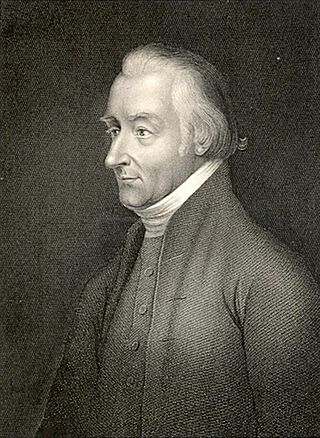
Lindley Murray was an American Quaker lawyer, writer and grammarian, best known for his English-language grammar books used in schools in England and the United States.
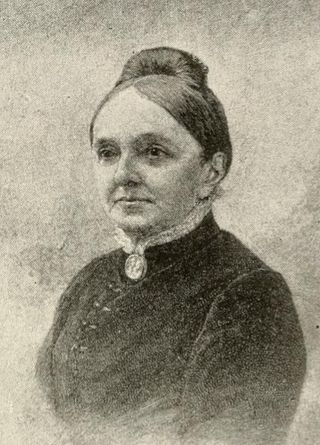
Rose Terry Cooke was an American author and poet. Some of her earliest contributions were published in Putnam's Magazine; and the Atlantic Monthly, in which she wrote the leading story in the first number; then in the Galaxy, published in Philadelphia; and in Harper's. A very popular story by Cooke was "The Deacon's Week". Her short stories of New England life would fill several volumes. Cooke's dream was that of developing her powers of poetry. Her first verses were printed in the New York Tribune, using her mother's initials for a pseudonym.

Hannah Adams was an American author of books on comparative religion and early United States history. She was born in Medfield, Massachusetts and died in Brookline. Adams was the first woman in the U.S. who worked professionally as a writer.
Antitactæ, or antitactici, in antiquity, were a Gnostic sect who believed that God was good and just, but that one of his creatures had created evil, and had engaged humans to follow it, in order to set us in opposition to God. They believed that it was the duty of humanity to oppose this author of evil, in order to avenge God of his enemy. Their name is from the ancient Greek for "I oppose; I am contrary".
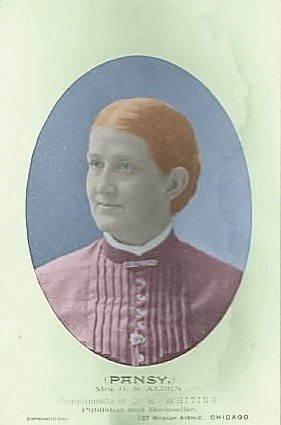
Isabella Macdonald Alden was an American author. Her best known works were: Four Girls at Chautauqua, Chautauqua Girls at Home, Tip Lewis and his Lamp, Three People, Links in Rebecca's Life, Julia Ried, Ruth Erskine's Crosses, The King's Daughter, The Browning Boys, From Different Standpoints, Mrs. Harry Harper's Awakening, The Measure, and Spun from Fact.

Caroline Howard Gilman was an American author. Her writing career spanned 70 years and included poems, novels, and essays.
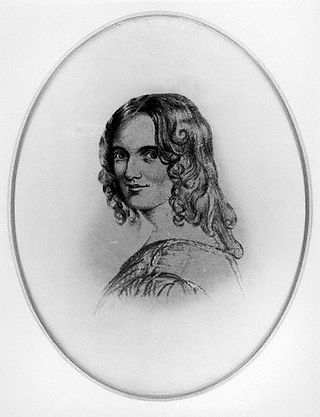
Sarah Fuller Flower Adams was an English poet and hymnwriter. A selection of hymns she wrote, published by William Johnson Fox, included her best-known one, "Nearer, My God, to Thee", reportedly played by the band as the RMS Titanic sank in 1912.
John Debrett was an English publisher and compiler. His name has become associated with reference books.

John Minter Morgan (1782–1854), was an English author and philanthropist.
Charles Buck (1771–1815) was an English Independent minister and theological writer, known for his Theological Dictionary.

A View of Religions is an 18th-century comprehensive survey of world religions by the American author, Hannah Adams. First published in Boston, Massachusetts in 1784, it was a pioneering work in that it represented denominations from the perspective of their adherents, without imposing Adams' own preferences. The book was divided into sections and passed through several editions, which included minor changes in the name of the work. It was reprinted in England. A View of Religions was Adams' first and principal literary work. It was the result of her dissatisfaction with the prejudice of most writers on the various religious sects. She began thinking on the subject after reading a manuscript from Thomas Broughton's Historical Dictionary of all Religions from the Creation of the World to the Present Times (1742).
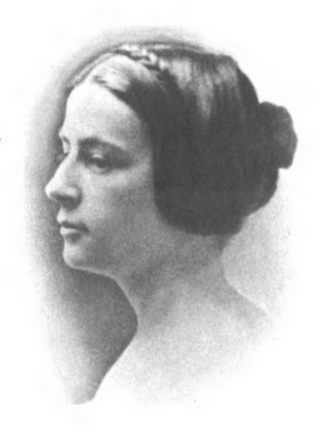
Martha Perry Lowe was an American writer of poetry and prose, as well as a social activist and organizer. She supported women's rights, temperance, education, and Unitarian organizations. Born in New Hampshire in 1829, her parents were General Justus Perry and Hannah Wood. She was a descendant of William Wood, the supposed author of New England's Prospects, who left England and settled in Concord in 1638. At the age of 15, Lowe was sent to Sedgwick's School for Young Ladies. After her graduation, she spent a winter in the West Indies, and the following year was passed in Madrid with her brother, who was a member of the Spanish legation. In 1857, she married the Rev. Charles Lowe who died in 1874, and at the time of his death was a member of the Somerville school committee. In 1871, when the family went to Europe, Lowe corresponded regularly for the Liberal Christian. In Somerville, she was connected with the Unitarian Review. She was the author of several books of prose and poetry; the most noted ones include The Olive and the Pine, Love in Spain, and a Memoir of Charles Lowe. She was interested in many public and private philanthropies, but her chief interests were in the public schools. She was among the first to advocate the teaching of cooking and sewing, and at her suggestion a sum of money was raised for that purpose. She was one of the founders of the Educational Union in Somerville, one of whose duties was a regular visitation of the schools by its members. She was a member of the Society of American Authors of New York, the Authors' Club of Boston, the Woman's Education Association, and the Unitarian Church Temperance Society, as well as an honorary member of the Castilian Club, of the Heptorean Club, of the Teachers' Annuity Guild, honorary president of the Woman Suffrage League, a director of the Massachusetts Suffrage Association, president of the Woman's Alliance of the First Unitarian Church, and a member of the Cambridge Branch of the Indian Association. She died in Massachusetts in 1902.

Helen M. Winslow was an American editor, author, publisher, and journalist. She began her work on Boston papers. Winslow served as dramatic editor on The Beacon, 1891–97; editor, Woman's Club Department, Boston Transcript, 1893–98; editor, Woman's Club Department of the Delineator, 1897, and again 1912; editor and publisher, The Club Woman, 1897-1904; and she was the publisher of the Official Register of Women's Clubs in America from 1897. She was the author of Salome Sheppard, Reformer. 1893; Concerning Cats, 1900; Concerning Polly, 1902; Literary Boston or To-day, 1902; The Woman of To-morrow, 1905; The President of Quex, 1906; Peggy at Spinster Farm, 1908; A Woman for Mayor, 1910; The Pleasuring of Susan Smith, 1912; and At the Sign of the Town Pump, 1913. She collaborated with Frances Willard in Occupations for Women, and with Marie Wright in Picturesque Mexico.

A Summary History of New-England is an 18th-century history book regarding New England by the American author, Hannah Adams. It was first published in Dedham, Massachusetts in 1799, by Herman Mann and James H. Adams, and followed her A View of Religions, which was published in 1784. Not arrogating to herself the honors of an original historian, Adams exonerated herself from a large share of responsibility, and at the same time earned considerable merit by the judicious use which she has made of the labor of others. She included or abridged their accounts, as occasion demanded.
Elizabeth Scott Williams Smith was an 18th-century British-born American poet and hymnwriter. Prior to 1750, she wrote many hymns with the largest of her known manuscript collections containing 90 of these. The first publication of her hymns was in The Christian's Magazine, edited by William Dodd, 1763. Nineteen of her hymns were given in John Ash and Caleb Evans' baptist Collection, Bristol, 1769, and twenty in John Dobell's New Selection, 1806. Of these, one of the best known is "All hail, Incarnate God". Smith died in 1776.
Jane T. H. Cross was an American author. She was, for some years, an occasional contributor of prose and poetry to the religious journals of the South. She wrote a series of stories for children, which were collected and edited by Dr. Summers, and published in four small volumes, called, Wayside Flowerets, Heart Blossoms for My Little Daughters, Bible Gleanings, and Driftwood. Gonzalo de Cordova was a translation from the Spanish; Duncan Adair, was a novel; and Azile, was a story partly of Southern experiences during the American Civil War. Upon her return from Europe, her letters from abroad were collected and published.
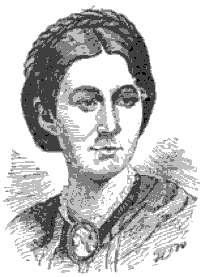
Sallie Rochester Ford was an American denominational writer and newspaper editor of the long nineteenth century. She was the author of, Grace Truman, Mary Bunyan, Evangel Wiseman, Ernest Quest, The Inebriates; Raids and Romance of Morgan and His Men, and The Life of Rochester Ford. She assisted her husband in the editing and publishing of the Christian Repository, a Baptist monthly for almost half a century. Ford was a leading author of the Baptist denomination, and a subtle and effective interpreter of its tenets.

Eva Munson Smith was an American composer, poet, and author. She was the author of Woman in Sacred Song (1885), a representative work of what women have done in hymnology. She was the author of a large number of temperance songs and other works, which became very popular. Her poems appeared in Poets of America and other standard works. Her best known productions were "Woodland Warblings", "American Rifle Team March", and "I Will Not Leave You Comfortless".

Sarah Katherine Taylor was an American evangelist and temperance activist. She was the editor of, The Little Christian, All Nations Monthly, and Bible Faith Mission Standard.
Delia Lyman Porter was an American author, social reformer, and clubwoman. She was a prominent civic worker, associated with the prohibition and the parent–teacher association movements. Porter published books, calendars, short stories, compilations, articles, and religious outlines.














